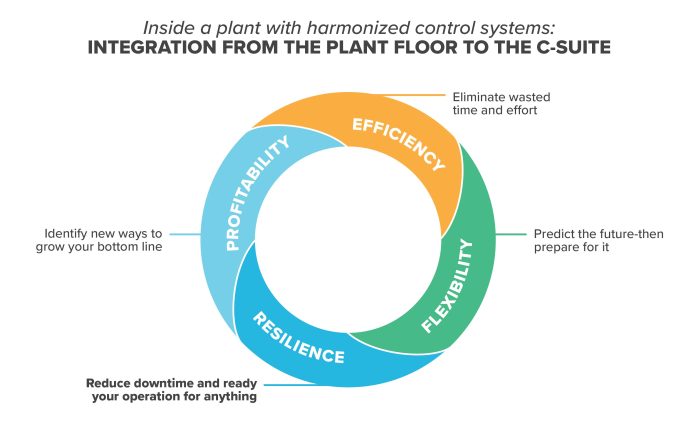The Importance of Control System Integration in Modern Manufacturing
In today’s fast-paced manufacturing world, staying competitive means embracing new technologies and smarter processes. One of the most important elements in modern manufacturing is control system integration. This integration ties together various machinery and systems, enabling them to work seamlessly as a unified whole. Without this level of coordination, even the most advanced equipment may not reach its full potential. For manufacturers looking to optimize production, a controls integrator plays a key role in making this possible. Let’s explore how control system integration brings major benefits to the manufacturing floor.
Smoothing out operations to boost overall efficiency
Efficiency is the cornerstone of any successful manufacturing operation. Control system integration allows manufacturers to streamline operations, eliminating unnecessary steps and reducing downtime. When systems are properly integrated, they can share information and work together in harmony, speeding up production and reducing bottlenecks. This means faster turnaround times without sacrificing quality.
With a controls integrator handling the integration process, manufacturers can also automate many of their operations, making sure that everything flows smoothly. The result? A more efficient production line that can handle higher demand while maintaining a steady rhythm. By linking all equipment into one cohesive system, manufacturers can reduce idle time and focus on what matters most—delivering quality products on time.
Cutting down on mistakes with precise automation
One of the biggest challenges in manufacturing is human error, which can lead to costly mistakes and production delays. By integrating automation into the system, manufacturers can reduce the likelihood of errors, as machines can perform repetitive tasks with greater precision. Control integration helps ensure that machines are programmed to follow exact instructions, making it easier to achieve the desired outcome.
A control system integrator can fine-tune automated processes, ensuring that they are tailored to the specific needs of the production line. This kind of customization is invaluable in preventing mistakes before they happen, allowing companies to maintain a high level of consistency in their products. Plus, automation takes the burden off employees, freeing them up to focus on more complex tasks that require human expertise.
Making sure machines and systems communicate effortlessly
Communication is key in any operation, and manufacturing is no exception. Control system integration ensures that all machines and systems can communicate effortlessly with one another. When equipment is connected and can share real-time data, it allows for better coordination and fewer delays. Whether it’s a conveyor belt, robotic arm, or packaging machine, everything works together as one cohesive unit.
A controls integrator specializes in setting up these communication networks so that each piece of machinery speaks the same “language.” By ensuring that machines are on the same page, manufacturers can eliminate miscommunication and the resulting downtime. This kind of seamless operation not only speeds up production but also helps to ensure that the final product meets the necessary standards.
Using resources wisely to keep production costs down
In the world of manufacturing, keeping costs low while maintaining high standards is a constant challenge. Control system integration offers a smart way to manage resources efficiently, reducing waste and minimizing unnecessary expenses. When systems are integrated, manufacturers can optimize the use of materials, energy, and labor, cutting down on waste without compromising on quality.
With control integration, it’s possible to track resource usage in real-time and make adjustments as needed. A control system integrator can program systems to minimize energy consumption during off-peak hours or ensure that machines run at optimal efficiency levels. This level of precision helps companies stay competitive by keeping production costs down while still delivering top-notch products.
Keeping processes consistent to maintain high-quality output
Consistency is crucial in manufacturing. Customers expect every product they receive to meet a certain standard, and any deviation from that standard can damage a company’s reputation. Control system integration makes it easier to maintain consistency by ensuring that processes are repeatable and reliable. Integrated systems can follow the same set of instructions with minimal variation, leading to a higher level of product uniformity.
By working with a controls integrator, manufacturers can ensure that their processes are designed for consistency from start to finish. This means that even complex tasks can be carried out with the same precision every time, reducing the chances of defects or quality issues. In the long run, this level of consistency translates into happier customers and fewer returns.
Providing real-time monitoring for quicker fixes and maintenance
Downtime is the enemy of efficiency in manufacturing. The longer a machine is down, the more costly the delay. Control system integration allows for real-time monitoring of equipment, enabling manufacturers to catch problems before they escalate. With real-time data, operators can see exactly where issues are happening and address them quickly.
A control system integrator can set up monitoring systems that provide alerts the moment something goes wrong. This proactive approach means that maintenance teams can jump into action before a minor issue turns into a major breakdown. Quick fixes mean less downtime and a smoother overall production process, keeping everything on schedule and reducing lost revenue



